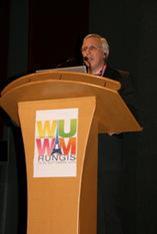
London’s wholesale markets’ customers are vastly increasing the carbon emissions attributed to fresh produce unnecessarily, a leading academic told the trade last week.
New research into the customers of New Covent Garden Market (NCGM), Western International and New Spitalfields wholesale markets has revealed an extra 500,000km are driven each year to frequent markets that are further away than their nearest alternative.
Dr Andrew Palmer of the Cranfield School of Management told delegates at the World Union of Wholesale Markets conference that 270 tonnes of CO2 could be cut out each year by travelling to their nearest wholesale markets.
Palmer told FPJ: “Retailers have cultivated long-term customer-wholesaler relationships and are keen to hold on to those relationships, regardless of the distance travelled. Also, some of the ethnic foods are only available at certain markets, but if the range were diversified a little more, we could save 500,000km a year.
“Driving past New Spitalfields or NCGM to get the same produce from Western International or vice versa is ridiculous and, similarly, delivering the other way is not good. There may be an option in having smaller subsidiaries in other markets so you could have the diversity without creating extra carbon.”
In a wide-ranging presentation into sustainability, Palmer urged the industry to transfer its produce from road onto rail in a bid to help the environment. He also questioned the credentials of various local sourcing initiatives.
He said: “I’m not convinced local sourcing is as good as it is made out to be as in a lot of cases, old vehicles picking up smaller amounts of produce are not as green as the new, larger vehicles being used.
“The greenest option that needs to be explored further is combining loads to attempt to reduce kilometres and, more importantly, costs. Sainsbury’s and Nestle have saved 258,750km by merging transport and this is something that should be used as an example.”



